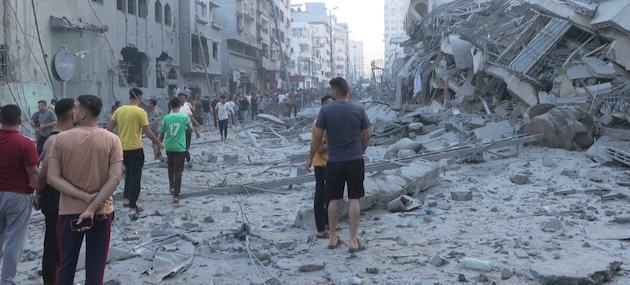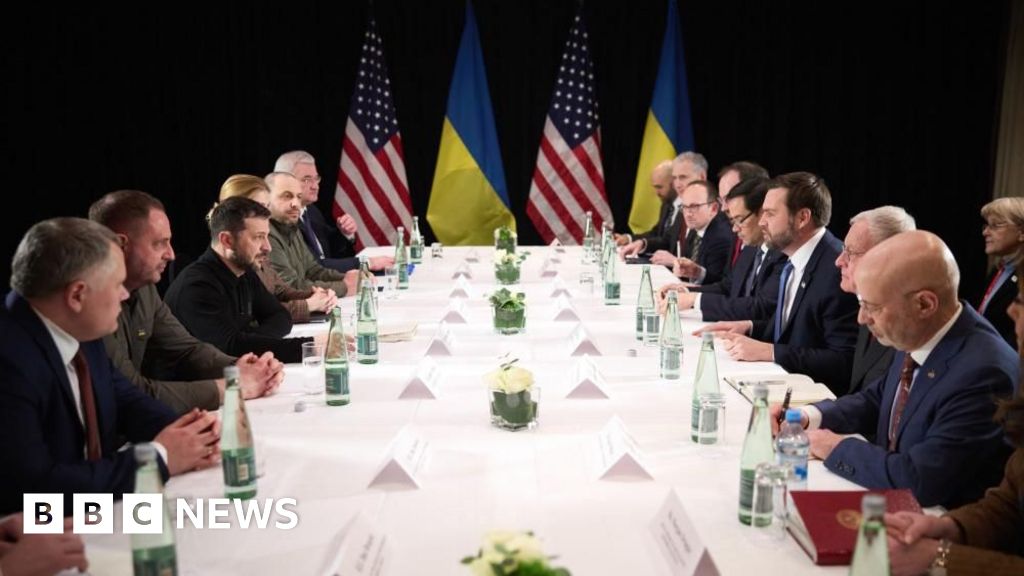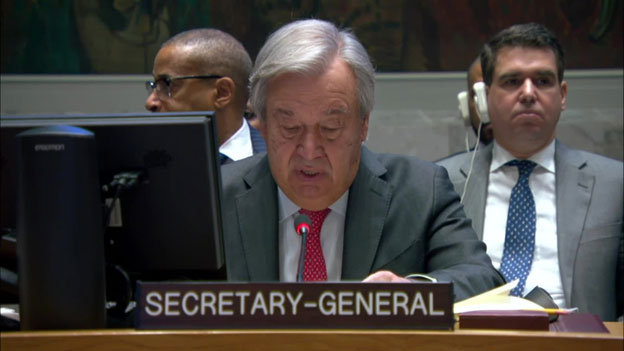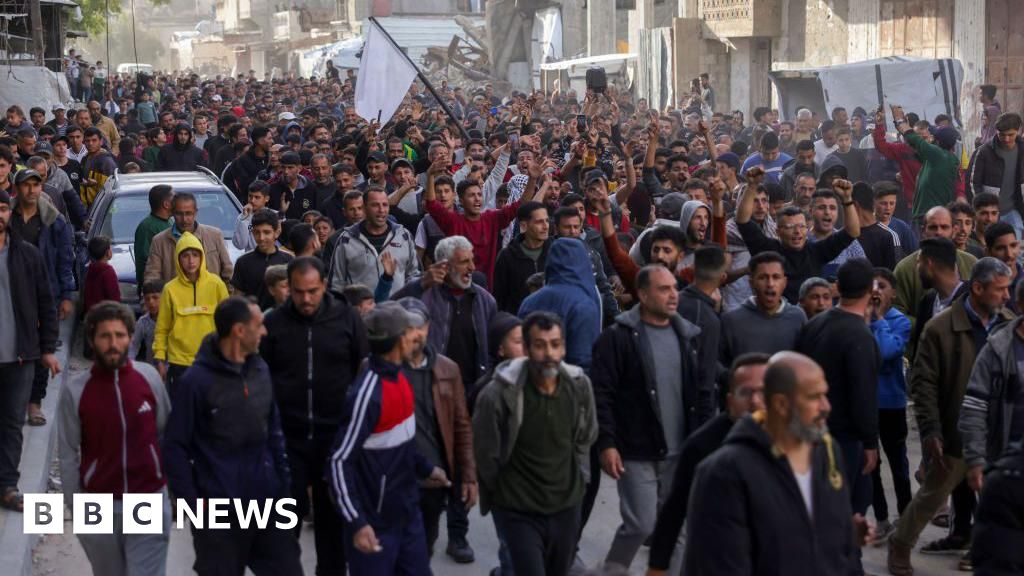Alarm Raised as Israels Ground Military Invasion, Blockade of Gaza Strip Looms — Global Issues
NAIROBI, Oct 11 (IPS) – It is a bloodbath and unmitigated mayhem as heavy fighting unfolds between Israeli forces and the Palestinian group Hamas which has taken the world by surprise. Amidst raids, rockets and sustained fierce gunfire, bombs, and death, a humanitarian crisis is unfolding. Now, both sides are warned to consider the impact of their actions on the civilian population.
Thousands have been killed on both sides and injured in unexpected violent clashes since Saturday, October 7, 2023. Israel has since cut off electricity, water, and food supplies to Gaza, further tightening the illegal siege it has imposed on the estimated 2.2 million Palestinians – half of them children – in Gaza since 2007 and is reportedly preparing for a large-scale ground invasion in addition to ongoing air strikes.
“More than 900 Israelis and at least 750 Palestinians have been killed. It is a time of unprecedented grief, anguish, and sorrow for many people in Palestine-Israel, and we want to start this Webinar by recognizing that all human lives are precious. That the deliberate attacks against civilians we have seen thus far are always wrong and can never be justified,” said Josh Ruebner, Institute for Middle East Understanding’s (IMEU) Director of Government Relations, while moderating a virtual emergency briefing on the Palestine-Israel conflict.
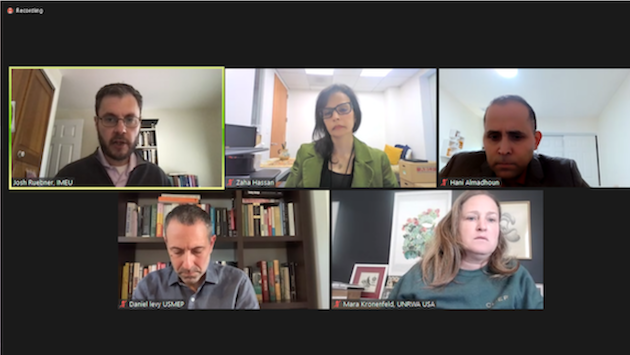
“While the violence may be unprecedented in scope in terms of what Israeli civilians are facing today, sadly, this scope of violence directed towards civilians is not unprecedented for Palestinian civilians. And, of course, we have to understand that the conflict did not start on Saturday. There is a history and a context that we need to discuss to have a proper understanding of the events that we are seeing unfold today.”
Ruebner stressed that now is the time to approach the Palestine-Israel situation with wisdom and understanding and to save lives.
“It is not the time to exacerbate the violence by providing Israel with more weapons. Now is the time to re-evaluate the actions that all of us can take to deliver the peace that everyone, Palestinian and Israeli, deserves. There is no going back to the status quo of Israeli apartheid and oppression in Israel’s denial of freedom to the Palestinian people. It is time to pursue and realize justice so that peace may resume.”
Against this backdrop, Mara Kronenfeld, executive director of UNRWA USA – the United Nations Relief and Works Agency for Palestine Refugees (UNRWA) in the Middle East – painted a dire picture of the situation in Gaza. Heavy airstrikes since Saturday have displaced nearly 190,000 people in Gaza, so the UN relief agency for Palestine refugees, UNRWA, is sheltering 137,500 men, women, and children in 83 of its 288 schools, according to the agency’s latest situation report. As of Tuesday, 18 UNRWA facilities sustained collateral and direct damage from airstrikes, with injuries and deaths reported.
She said that except for the bread that the World Food Programme is distributing under great difficulties, there is nothing else to eat in the Gaza Strip as shops and grocers that have survived the bombing remain closed. It is a moment-to-moment survival against the violent onslaught that is likely to worsen if Israel brings Gaza under a total siege as already promised. In this context, panellists analyzed the human, political, legal, and historical dimensions of the ongoing escalating violence.
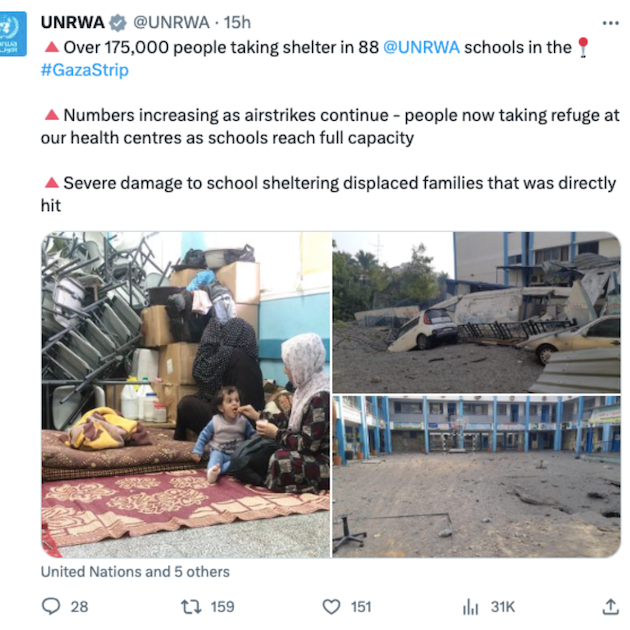
“Since Saturday, we have not been able to get a hold of our whole family – they live up North. The internet and phone services have been disrupted, and the electricity has been cut off. We are having great difficulties connecting with family. We came back from Gaza two months ago and were happy to see that people were starting to access opportunities. There is a sense of life in Gaza in the summer because it is a beach town, but a very sad beach town right now, and the reality is that death is all around,” explained Hani Almadhoun.
“My sister escaped death by a minute the other day when she ventured out to buy bread, and there was a massacre of about 50 people. My sister said that it was a bloodbath of civilians. My father has a grocery store, and he has not been able to open it. People are going without the very basic necessities.”
On international legal obligations in the context of the Israel-Palestine conflict, Zaha Hassan – Outreach Associate of Just Vision in Gaza – said both Israel and Hamas are under a legal obligation to avoid targeting civilians or recklessly engaging in military activity without regard to civilian lives. Israel is the occupying power and, as such, bears the duty and responsibility to protect civilian life in Gaza, the same way it has a duty to protect Israeli civilians.
“Gaza is still occupied territory. Israel controls all aspects of Palestinian life in Gaza, from birth to death and everything in between – whether it is access to food, water, and electricity. Israel can come in and out of Gaza at will. We are now waiting for the Israeli military to possibly enter Gaza with ground troops. It should be noted that Palestinians have an international legal right to resist occupation, but like Israel, Palestinian’s resistance fires must be guided by the legal doctrine of distinction and proportionality. What we know from past bombardment invasions of Gaza is that Israel has not made these distinctions,” Hassan emphasized.
Daniel Levy, President of the U.S./Middle East Project (USMEP) and former advisor to former Israeli Prime Minister Ehud Barak, spoke about the policy ramifications of Israel declaring war on Gaza. He was appalled that even though the events that unfolded last Saturday were regrettable, a promise could be made on the back of those events to commit heinous war crimes in Gaza. He was speaking about the public announcement that Israel was at war with Hamas and that what was therefore before will no longer be – a dire warning of the atrocities to come.
Levy said that it was inexcusable that the world shrugged at this promise of death and destruction, committed support to Israel and promised more weapons to undertake and execute a war crime. He urged the global community to step back and acknowledge that the Israel-Palestine history did not begin at 6 am in the morning on Saturday. There is a long history as to why Palestinians in Gaza are still refugees and why they are trying to go back home.
IPS UN Bureau Report
Follow @IPSNewsUNBureau
Follow IPS News UN Bureau on Instagram
© Inter Press Service (2023) — All Rights ReservedOriginal source: Inter Press Service
Check out our Latest News and Follow us at Facebook
Original Source

